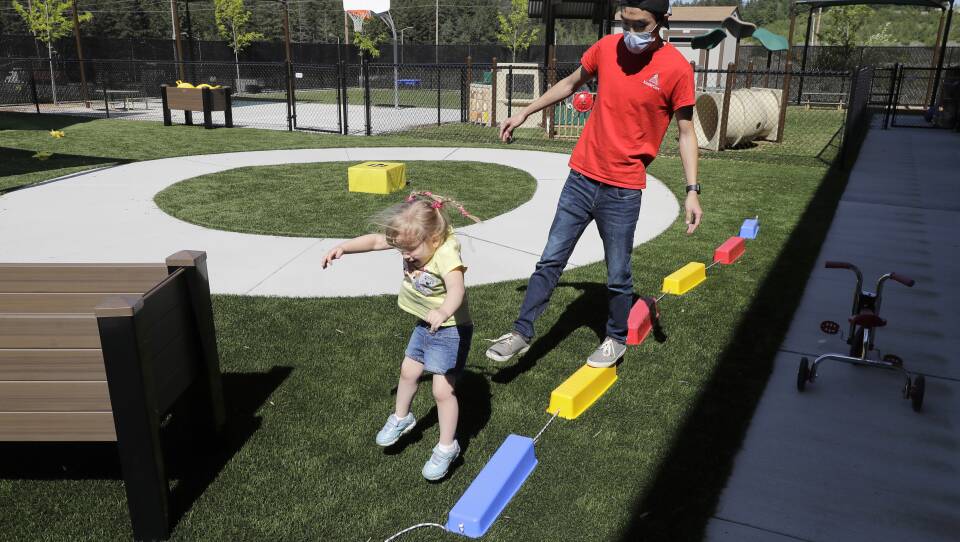Updated at 4:37 p.m.
Thousands of child care and early education centers will be able to tap into the state's supply of rapid COVID-19 antigen tests beginning at the end of January for use in a new test-and-stay program rolled out by Gov. Charlie Baker on Wednesday designed to allow classrooms to remain open.
Baker and top education officials described the program as essential to the state's economic recovery and the health and development of youth that will give working parents greater dependability in their child care and children the school structure that they need.
"It's a huge part of how you keep centers somewhat predictable, reliable and dependable for kids, especially, and also for the parents, many of whom are working parents who need to have the predictability and dependability and reliability with knowing that their centers are open, available and safe," Baker said.
Center and family-based child care providers enrolled in the program will be given free rapid COVID-19 antigen tests to be used on children and staff age 2 and older who are close contacts of a COVID-19 positive individual. Students and staff who test negative daily for five consecutive days could be allowed to remain in their classrooms, officials said.
Tests will also be available for day care centers that want to engage in symptomatic testing to isolate positive individuals and rule out COVID-19 in other children and staff who might have symptoms similar to those that come with the virus.
Early education experts, however, said it could take time for providers to figure out how to apply a program at their facility. One question is whether staff or parents will administer tests, and whether it should be done at home or on site. Another is how to treat families with children under 2 who have not been approved for rapid testing.
"I think centers and family child care providers are looking for resources and guidance so there's an appreciation of that. Taking all this information into daily practice is another whole challenge," said Amy O'Leary, executive director of Strategies for Children.
The governor visited Ellis Early Learning in Boston on Wednesday to detail the two new testing programs being made available to the more than 7,500 child care centers across the state. The announcement came a day after Baker offered a new testing strategy for K-12 schools that would make rapid tests available to districts that want to engage in weekly at-home surveillance testing.
All the new testing initiatives will rely on the supply of 26 million rapid COVID-19 antigen tests purchased earlier this month from iHealth in California. Early Education and Care Commissioner Samantha Aigner-Treworgy said it's too early to know how long supplies will last for the test-and-stay program, but Baker said he hopes to "run this for awhile" and reassess in, maybe, April.
"We expect the rapid test program will be a game changer for many folks in early education and care as the vast majority of kids they serve are under the age of five and therefore can't be vaccinated at this point in time," Baker said.
The state will partner with Neighborhood Villages, a nonprofit early child care advocacy group, for test distribution and training. Neighborhood Villages has also been running a state-funded pooled testing program for child care centers since last year.
"Testing in early ed is one of the most effective investments we can make right now to keep child care open and the economy going," Sarah Siegel Muncey, co-founder of Neighborhood Villages, said.
Child care providers signed up with Neighborhood Villages by Jan. 24 will begin to receive rapid tests the week of Jan. 31.
The deployment of rapid tests comes after several weeks of K-12 schools and early education classrooms struggling to find a balance between educating and caring for children and keeping students and staff safe. The surge in COVID-19 cases has caused staffing shortages throughout the education system, and many child care centers have adopted quarantine policies that require entire classrooms to shut down when cases surface.
"We know that as we move through COVID-19 recovery ensuring that parents can rely on child care is an essential part of getting back to normal," Aigner-Treworgy said.
Asked about child care providers that might have more stringent return-to-school policies than those being suggested by the Baker administration, Aigner-Treworgy said: "We'll be working to make sure that our providers understand the protocols that we're laying out that are informed by public health professionals and can use that to apply to their own business operations to help make sure that they're using the tests in the best way possible."
O'Leary said the public-private partnership model being used in Massachusetts to bring testing to a patchwork of day care providers is "pretty incredible," and that other states and the White House are looking to the state for guidance.
At the same time, she said, providers and families are looking for an alignment of policies for children across the age spectrum, and she said she's heard from families frustrated by the various rules for different age groups.
"I do think it would be helpful for the state to lay out, "This is what it looks like,' because it can be hard to track," O'Leary said.
Aigner-Treworgy explained that the cohort and symptomatic rapid testing programs would be available for all children age 2 and older, while the pool testing program is only for children age 3 and older because the PCR tested used have not been approved for use in younger children.
Update: This story was updated with additional details and reporting.







